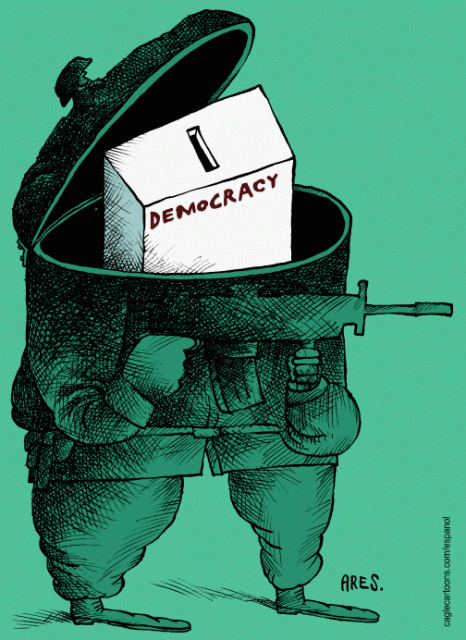Search
Recent comments
- heat....
39 min 10 sec ago - economic warming....
2 hours 13 min ago - hate-ish....
2 hours 55 min ago - the new mood....
3 hours 21 min ago - devingels....
3 hours 28 min ago - cyprus capers....
4 hours 55 min ago - quack....
5 hours 7 min ago - prepare....
5 hours 14 min ago - for sale....
10 hours 10 min ago - SKYD AF!!!
10 hours 48 min ago
Democracy Links
Member's Off-site Blogs
a benevolent hegemony .....

‘Although Donald Rumsfeld claimed that "we don’t seek empires" and "we’re not imperialistic," I don’t hesitate to use the terms. Not only did the 9/11 Commission Report conclude that "the American homeland is the planet," it referred to the Department of Defense as "the behemoth among federal agencies. With an annual budget larger than the gross domestic product of Russia, it is an empire."
The extent of the U.S. global empire is almost incalculable. The Department of Defense’s "Base Structure Report" states that the Department’s physical assets consist of "more than 600,000 individual buildings and structures, at more than 6,000 locations, on more than 30 million acres." There are over 700 U.S. military bases on foreign soil. There are U.S. troops stationed in 159 different regions of the world in every corner of the globe. There are 285,000 U.S. troops stationed in foreign countries, not counting the 200,000 troops in Iraq and Afghanistan. There are 100,000 U.S. soldiers in Europe to face a non-existent Soviet Union.
The United States has commitments to provide security to over 35 countries. The United States still maintains 64,000 troops in Germany, 33,000 troops in Japan, and 10,000 troops in Italy – sixty years after we defeated them in World War II. We have, in fact, never stopped mobilizing for war since World War II, manufacturing enemies where we could find none. In addition to military personnel, the Department of Defense employs 675,000 people worldwide, including thousands of foreign nationals.
But instead of all of this being an example of imperialism and empire, we are told by neoconservative intellectuals that the United States is merely exercising "benevolent hegemony."’
War, Gunboat Diplomacy & The Church
and to put the scale & nature of this “benevolent hegemony” into a more meaningful context …..
‘According to the educated guess of military researcher John Pike, the director of GlobalSecurity.org, U.S. forces have expended at least 250,000 small-caliber bullets for every insurgent killed in the present wars. That's a lot of misses, for which the people of Iraq and Afghanistan are no doubt grateful. With better marksmanship, U.S. forces could have already slain a large fraction of the people residing in those unfortunate countries. Of course, medium- and heavy-caliber bullets, artillery and mortar shells, rockets, and bombs have also killed many people in the present wars, their vastly greater force compensating for the smaller numbers expended.
The application of overwhelming firepower in lieu of alternative tactics has long been the American way of fighting a war. In World War II, U.S. factories cranked out, along with mountains of other munitions, about 41.4 billion rounds of small-arms ammunition, enough to permit the users to take about ten shots at every man, woman, and child alive on earth at that time. Military historians tell us that the U.S. warriors actually concentrated their fire somewhat, so some of the earth's inhabitants were spared exposure to that particular risk.
Among the many fiscal measures for which mainstream economists can credit the current Bush administration, we may count a tremendous stimulation of the demand for ammunition – as much a blessing in bulking up the GDP as purchases of any other final good, they insist. According to a July 2005 report by the Government Accountability Office, "[b]etween fiscal years 2000 and 2005, total requirements [per year] for small caliber ammunitions more than doubled, from about 730 million to nearly 1.8 billion rounds, while total requirements for medium caliber ammunitions increased from 11.7 million rounds to almost 22 million rounds."’
If You Miss The First Time, Try Firing Another 300,000 Rounds
- By John Richardson at 24 Jul 2007 - 11:22pm
- John Richardson's blog
- Login or register to post comments
the dishonor of the White House
From the Washington Post
War Crimes and the White House
The Dishonor in a Tortured New 'Interpretation' of the Geneva Conventions
By P.X. Kelley and Robert F. Turner
Thursday, July 26, 2007; A21
One of us was appointed commandant of the Marine Corps by President Ronald Reagan; the other served as a lawyer in the Reagan White House and has vigorously defended the constitutionality of warrantless National Security Agency wiretaps, presidential signing statements and many other controversial aspects of the war on terrorism. But we cannot in good conscience defend a decision that we believe has compromised our national honor and that may well promote the commission of war crimes by Americans and place at risk the welfare of captured American military forces for generations to come.
Uncivil restrictions
The attempt to prevent demonstrators from reaching Heathrow airport is the latest in a long line of erosion of civil liberties which started during Tony Blair's reign. But civil liberties groups hope Gordon Brown will mark a clear break with his predecessor by reversing the trend.
Their anger centres on the use of Section 44 of the 2000 Terrorism Act, which gives police the power to stop and search anyone in an area considered a likely terrorist target. It was used most notoriously to hold Walter Wolfgang, the veteran peace activist who heckled Jack Straw, when he was Foreign Secretary, at the 2005 Labour conference.
-------------------
Gus: Same hubris coming soon to a Sydney centre near you.... Ah, the smell of APEC in spring...